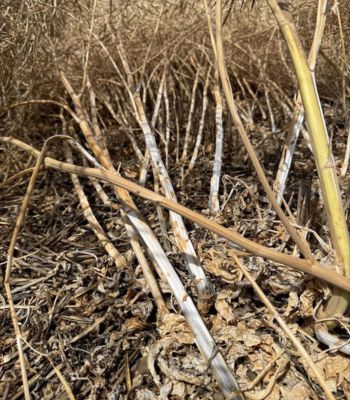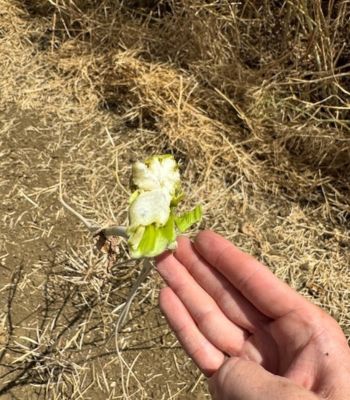OSR trials show effects of continuing pressure on Rlm7 resistance
15th July 2025
NPZ UK breeder trials have highlighted the impact of a challenging season on winter oilseed rape varieties that rely solely on Rlm7 resistance, compared to the latest hybrid varieties featuring combined RlmS and Rlm12 resistance.

Michael Shuldham of breeders NPZ UK said that a review of the oilseed rape trial plots at the site in Cambridge shows the pressure on some varieties following a tough, dry season.
He added: “We have a lot of Verticillium pressure in our oilseed rape trial, and where we see a combination of Phoma and Verticillium, the results can be devastating.
“Take this widely grown variety as an example. It has Rlm7 and pod shatter, but the stems and whole plant are dead, as the plant has senesced far too early, no longer able to take up nutrients or to support itself.”


Protecting OSR crops

Mr Shuldham explained that Rlm7 is a cotelydon resistance. It acts to stop a phoma lesion forming on the leaf, but when it is overcome, it has no effect against stem canker.
“We have seen a big breakdown of Rlm7 in recent years, and it is clear that on its own it is no longer enough to protect our rape crops.
“It underlines that RlmS, Rlm12 and Verticillium tolerance are the real keys to holding onto yield all the way to harvest.
“RlmS and Rlm12 work to stop the infection travelling down the petiole into the stem, stopping stem canker from forming,” the expert continued.
Mr Shuldham added that growers need to focus very strongly on RlmS or Rlm12-backed hybrid varieties for their oilseed rape this autumn.
“It’s the best way to keep their crops as clean as possible and reduce their risk of losing out before harvest even arrives.
“In our trials, Maverick with RlmS plus Rlm7 and our other oilseed rape varieties, such as our candidate Karat with RlmS plusRlm12, are showing the benefits of strong stem health from these genetics,” he concluded.
Read more arable news.
